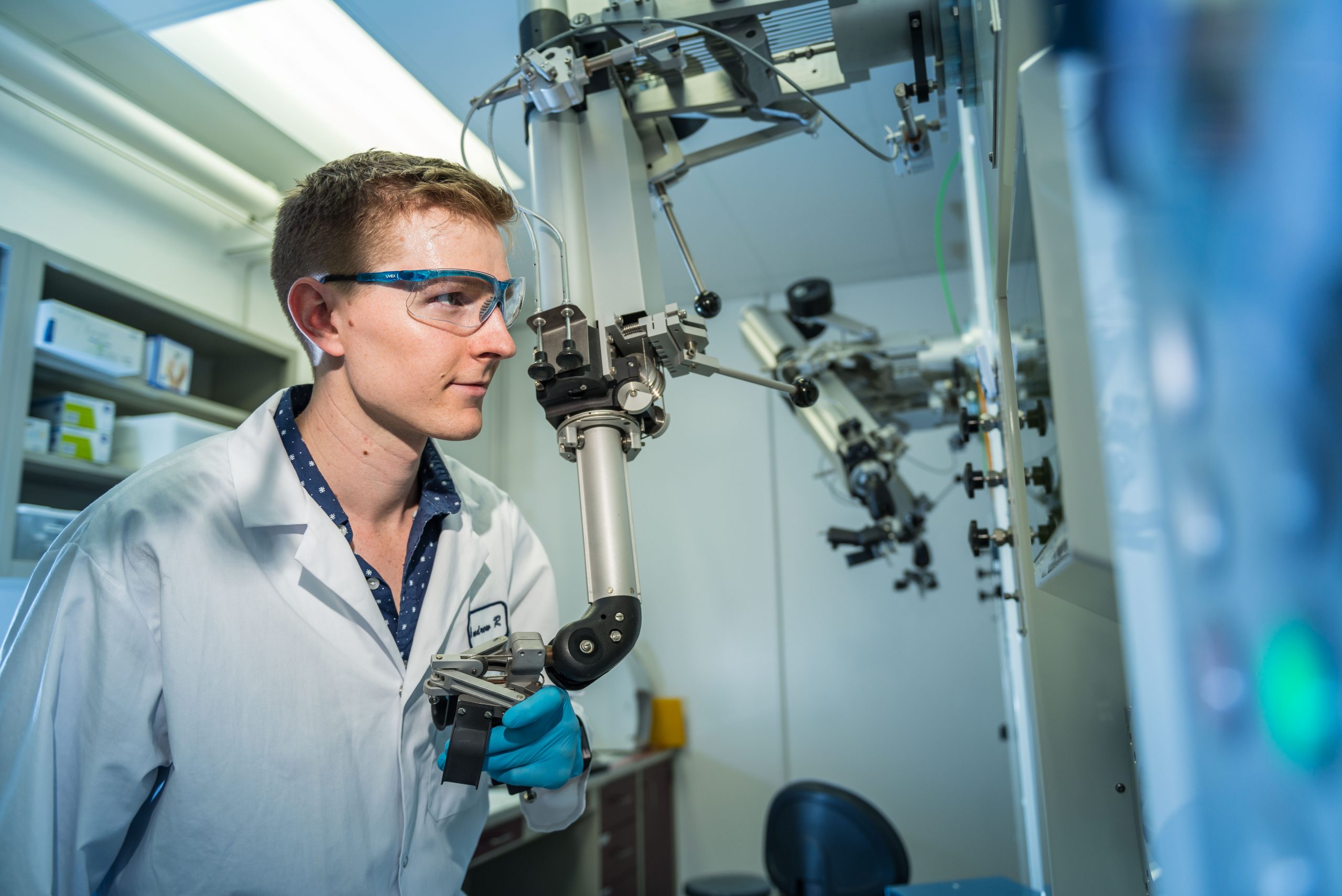
Andrew Robertson, TRIUMF Research Officer (Therapeutic Isotope Product Development), working in a TRIUMF radiochemistry laboratory. Credit: TRIUMF.
A made-in-Canada approach to producing the world’s most commonly used medical isotope has received Health Canada approval, ushering in a new era for patients in Canada and around the world who rely on these isotopes for critical diagnostic procedures.
A Canadian consortium, which includes UBC, BC Cancer, and TRIUMF, is the first in the world to obtain regulatory approval for this approach, allowing for the production of technetium-99m (Tc-99m) for clinical use in Canada using small particle accelerators known as cyclotrons.

Dr. François Bénard
(Photo credit: BC Cancer)
These workhorse medical isotopes are used in tens of millions of cardiac tests, cancer scans, and other diagnostic nuclear medical procedures around the world each year. However, global disruptions in reactor-based supply chains and isotope shortages have become a growing concern for medical professionals and patients.
Over a decade in the making, this landmark development—led by Dr. François Bénard and Dr. Paul Schaffer—helps secure a domestic supply of the isotope for Canadian patients.
“This new technology will provide Canadians with consistent access to the resources they need for life-saving medical scans, including cancer diagnostic scans,” said Dr. Bénard, professor of radiology and associate dean of research at UBC’s faculty of medicine and senior executive director of research at BC Cancer.
“This new technology will provide Canadians with consistent access to the resources they need for life-saving medical scans, including cancer diagnostic scans.”
Dr. François Bénard
“Medical isotopes help so many people every day, so it’s critical to have a multi-faceted supply chain to avoid unexpected disruptions to their availability,” said Dr. Schaffer, associate professor at UBC’s faculty of medicine and associate laboratory director, life sciences at TRIUMF. “The approval of cyclotron-produced Tc-99m by Health Canada is an important milestone for this Canadian innovation that will ultimately deliver direct benefit for Canadian patients.”
With Tc-99m now able to be produced for clinical use at regional cyclotron facilities in Canada, starting in B.C., dependence on nuclear reactor technology will be reduced, helping secure a stable, diversified, and environmentally friendly supply chain. The approval also clears Canada to bring the new technology to the global marketplace, facilitating regional production of Tc-99m either by upgrading existing cyclotrons around the world or installing new, dedicated high capacity regional production facilities.

Dr. Paul Schaffer
“Cyclotron centres across Canada can produce these isotopes locally and on-demand, and we have shown the path that can be used to achieve regulatory approval,” said Dr. Bénard. “The same approach can be followed at other sites in Canada and internationally. This has been a shared vision of many researchers across the country and we have to recognize the many collaborators who worked for years to make this announcement possible.”
This achievement is based on a national Canadian effort between many partners, including BC Cancer, TRIUMF, UBC, the Lawson Research Institute and the Centre for Probe Development and Commercialization. The clinical trial was conducted across multiple hospitals in Canada. Vancouver General Hospital and St. Paul’s Hospital were supplied with Tc-99m produced at BC Cancer while St. Joseph’s Health Care London and the Hamilton Health Sciences Centre were supplied from the cyclotron facility at Lawson Health Research Institute.
The process was approved by Health Canada on November 26, 2020 and is expected to be deployed first in B.C. at the Institute for Advanced Medical Isotopes (IAMI), which is currently under construction and expected to be operational in 2022. The IAMI is supported in part by a significant donation to the BC Cancer Foundation.
This project was also made possible through grants from the Natural Sciences and Engineering Research Council (NSERC), the Canadian Institutes for Health Research (CIHR), and Natural Resources Canada.